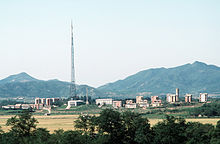机井洞
外观
(重定向自機井洞)
| 机井洞 | |
 | |
| 朝鲜语名称 | |
|---|---|
| 谚文 | 기정동 |
| 汉字 | 機井洞[1] |
| 文观部式 | Gi Jeong Dong |
| 马-赖式 | Ki Jŏng Dong |
机井洞是朝鲜民主主义人民共和国开城市板门区域平和里(朝鲜语:평화리/平和里*/?)[1]的一个洞。该洞位于朝韩非军事区(DMZ)北方境内。[2]机井洞被朝鲜称为平和村(朝鲜语:평화촌/平和村 p'yŏnghwach'on)[3],而西方国家和韩国媒体则称之为宣传村(朝鲜语:선전마을/宣傳마을 seonjeon maeul)[4][5][6][7][2]。
根据朝鲜停战协定,朝鲜战争休战,设立4公里宽的非军事区,该区中仅允许两座村庄存在:朝鲜的机井洞[6][8]和韩国的台城洞[8],两村距离约2.22千米(1.38英里)远。
村子的坐标是37.941761N, 126.653430E.。
历史
[编辑]
朝鲜政府称机井洞是拥有200家庭的集体农场,拥有幼儿园和中小学网、医院。[9]韩国方面则称机井洞是1950年所建设无人居住的宣传村庄,用来诱使韩国人投靠,村子中居住的是朝鲜人民军,负责维护边境上众多的军事设施碉堡和地下掩体。[2][3][10][11]
旗杆
[编辑]1980年代,韩国政府在台城洞建设了一个98.4米(323英尺)高的旗杆,上面有一面重130千克(287磅)的韩国国旗。
不久之后,朝鲜政府建设了更高的板门店旗杆,且是当时世界第一高的旗杆,高达160米(525英尺),上面的朝鲜国旗重270千克(595磅)。旗杆距离边境1.2 km(0.7 mi)(37°56'30.24"N, 126°40'48.07"E),被韩国方面称为战争旗杆。[10][12][13]直到2010年,被阿塞拜疆高162米(531英尺)的巴库国家旗杆广场旗杆超越。
图库
[编辑]-
机井洞
-
机井洞
-
机井洞全景+旗杆 (37°56'30.24"N, 126°40'48.07"E)
参见
[编辑]参考资料
[编辑]- ^ 1.0 1.1 기정동(機井洞)[트느피마을, 틀늪]. 북한지역정보넷 (North Korean Human geography). Galhyeon-dong, Seoul: 평화문제연구소. 2007-12-08 [2010-04-11]. (原始内容存档于2011-12-17) (韩语).
- ^ 2.0 2.1 2.2 Tran, Mark. Travelling into Korea's demilitarised zone: Run DMZ. The Guardian (London: Guardian Media Group). 2008-06-06 [2009-07-05]. (原始内容存档于2012-03-13).
Kijong-dong was built specially in the north area of DMZ. Designed to show the superiority of the communist model, it has no residents except soldiers.
- ^ 3.0 3.1 Kijungdong, North Korea's Propaganda Village November 12, 2006 存档副本. [2010-07-03]. (原始内容存档于2006-11-12).
- ^ Korean Demilitarized Zone - Globalsecurity.org http://www.globalsecurity.org/military/facility/dmz.htm (页面存档备份,存于互联网档案馆)
- ^ (朝鲜文) 북한의 기정동 선전마을. TourDMZ.com. [2006-10-09]. (原始内容存档于2011-07-17).
- ^ 6.0 6.1 Kozaryn, Linda D. Cohen: Economic Failure Plagues North Korea. DefenseLink (U.S. Department of Defense). American Forces Press Service. 1997-04-14 [2009-07-05]. (原始内容存档于2009-11-30).
- ^ Mansfield, Paul. 'This is Freedom Village,' said Sgt Manfull. The Independent (London: Independent News & Media). 1997-06-22 [2009-07-05]. (原始内容存档于2010-06-11).
- ^ 8.0 8.1 Flack, T.D. DMZ sixth-graders become graduates. Stars and Stripes, Pacific Edition (Tokyo). 2008-02-19 [2009-07-05]. (原始内容存档于2009-06-11).
- ^ A Sightseeng Guide to Korea by Pang hwon Ju & Hwang Bong Hyok, Foreign Languages Publishing House, Pyongyang, DPRK. 1991
- ^ 10.0 10.1 Potts, Rolf. Korea's No-Man's-Land (页面存档备份,存于互联网档案馆). Salon, February 3, 1999
- ^ Sullivan, Kevin. Borderline Absurdity: A Fun-Filled Tour of the Korean DMZ (页面存档备份,存于互联网档案馆). Washington Post Foreign Service, January 11, 1998.
- ^ Korea's DMZ: 'Scariest place on Earth'. 2002-02-20 [2007-10-23]. (原始内容存档于2020-04-22).
- ^ (朝鲜文) 개성에 '구멍탄' 5만장 배달했습니다. economy.ohmynews.com. [2006-12-06].[永久失效链接]



